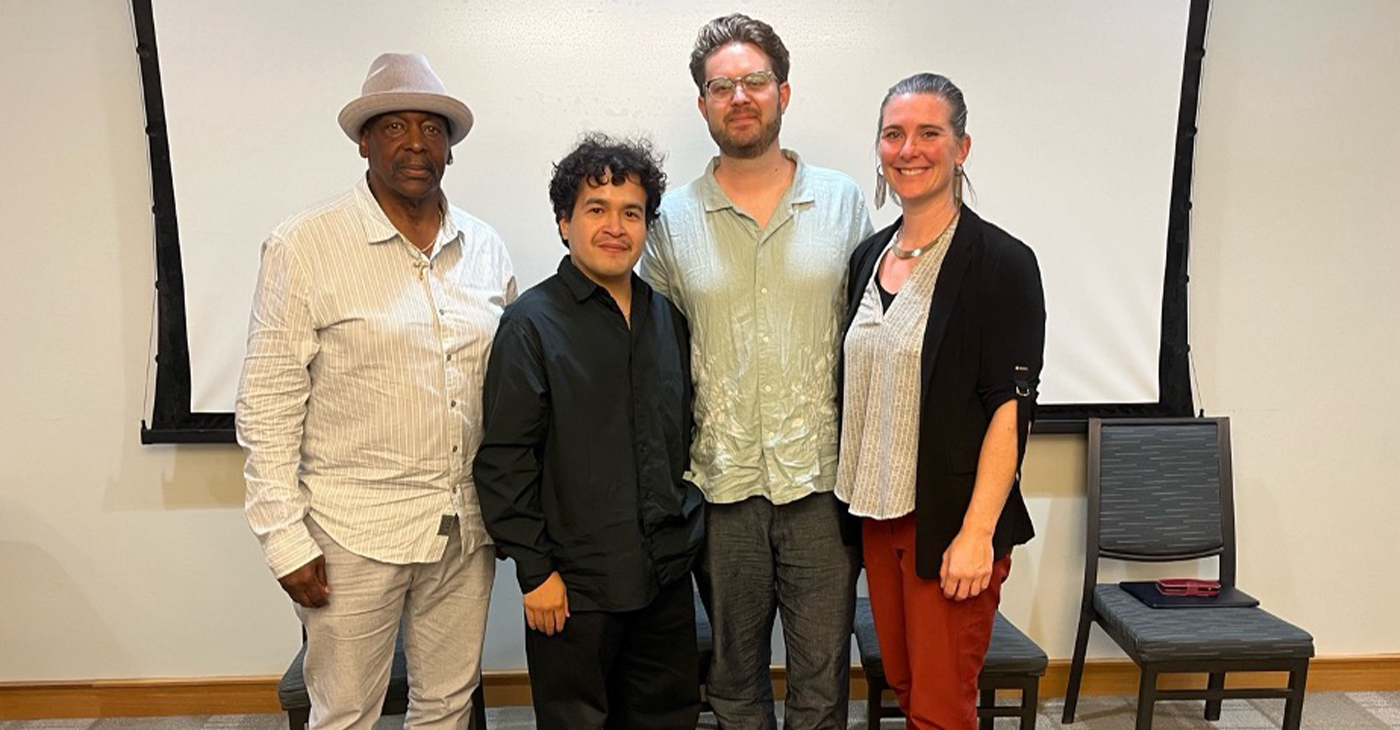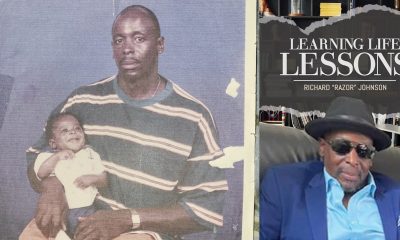Activism
Essay: A Survivor Relives “The Strike,” a Moving Film Capturing Injustices at Pelican Bay State Prison
It was a privilege to be invited to be part of the panel for the October 9th screening of the documentary “The Strike” at Sonoma State University.
Students from Caitlin Henry’s Criminology and Justice Studies class attended, and their engagement during the event was inspiring.

By Richard “Razor” Johnson
It was a privilege to be invited to be part of the panel for the October 9th screening of the documentary “The Strike” at Sonoma State University.
Students from Caitlin Henry’s Criminology and Justice Studies class attended, and their engagement during the event was inspiring.
After the screening, many students were deeply moved and had the opportunity to ask questions of the Director and Producer, JoeBill Muñoz and Lucas Guilkey, as well as myself, Richard Johnson, one of the hunger strike survivors and a panel speaker. I was one of the ten plaintiffs against the California Department of Corrections, a case that garnered the attention of the United Nations.
Some students lingered after the Q&A, expressing gratitude for raising awareness about the realities faced by those incarcerated. Their emotional responses highlighted the personal connections many have with the prison system, with some sharing experiences of relatives enduring similar conditions. It became clear that there was a significant lack of understanding about the Security Housing Units (SHU) and the stark differences between general population inmates and those confined in Pelican Bay.
On Oct. 23, the Grand Lake Theater will screen “The Strike,” a compelling documentary about Pelican Bay State Prison and the SHU. This film has received numerous accolades, including nominations for “Best Documentary” at the Imagen Awards and the Hot Docs Student Choice Award.
“The Strike” chronicles the harrowing experiences of California men subjected to decades of solitary confinement, culminating in the largest hunger strike in U.S. history. It will also be broadcast nationally on PBS’s Independent Lens in spring 2025.
This documentary is essential viewing, as it critically examines the failures of our judicial system in administering justice and the societal implications of our penal practices. It delves into the psychological torment endured by those held in isolation — many without any rule infractions — and exposes the broader victimization of individuals both inside and outside prison walls.
With over 33,000 inmates participating in the hunger strikes, the film provides an intimate exploration of the power dynamics at play, from the highest levels of state governance to the guards overseeing the units. It reveals the oppressive policies that perpetuate control and abuse within the prison system, ultimately leading to legal interventions to address these injustices.
Don’t miss this powerful documentary that challenges our perceptions of crime and punishment and highlights the resilience of those who fought for justice.
Join us on October 23 at the Grand Lake Theater at 6:30 PM. We will have Q&A at 8:00 PM after the screening with myself and some of the survivors. We look forward to your support and Tickets can be purchased online at www.renaissancerialto.com/TheStrike.php. For more information about the film, visit www.thestrikefilm.com.
Activism
Oakland Post: Week of November 26 – December 2, 2025
The printed Weekly Edition of the Oakland Post: Week of November 26 – December 2, 2025

To enlarge your view of this issue, use the slider, magnifying glass icon or full page icon in the lower right corner of the browser window.
Activism
Oakland Post: Week of November 19 – 25, 2025
The printed Weekly Edition of the Oakland Post: Week of November 19 – 25, 2025

To enlarge your view of this issue, use the slider, magnifying glass icon or full page icon in the lower right corner of the browser window.
Activism
IN MEMORIAM: William ‘Bill’ Patterson, 94
Bill devoted his life to public service and education. In 1971, he became the founding director for the Peralta Community College Foundation, he also became an administrator for Oakland Parks and Recreation overseeing 23 recreation centers, the Oakland Zoo, Children’s Fairyland, Lake Merritt, and the Henry J. Kaiser Convention Center.

William “Bill” Patterson, 94, of Little Rock, Arkansas, passed away peacefully on October 21, 2025, at his home in Oakland, CA. He was born on May 19, 1931, to Marie Childress Patterson and William Benjamin Patterson in Little Rock, Arkansas. He graduated from Dunbar High School and traveled to Oakland, California, in 1948. William Patterson graduated from San Francisco State University, earning both graduate and undergraduate degrees. He married Euradell “Dell” Patterson in 1961. Bill lovingly took care of his wife, Dell, until she died in 2020.
Bill devoted his life to public service and education. In 1971, he became the founding director for the Peralta Community College Foundation, he also became an administrator for Oakland Parks and Recreation overseeing 23 recreation centers, the Oakland Zoo, Children’s Fairyland, Lake Merritt, and the Henry J. Kaiser Convention Center.
He served on the boards of Oakland’s Urban Strategies Council, the Oakland Public Ethics Commission, and the Oakland Workforce Development Board.
He was a three-term president of the Oakland branch of the NAACP.
Bill was initiated in the Gamma Alpha chapter of Kappa Alpha Psi Fraternity.
In 1997 Bill was appointed to the East Bay Utility District Board of Directors. William Patterson was the first African American Board President and served the board for 27 years.
Bill’s impact reached far beyond his various important and impactful positions.
Bill mentored politicians, athletes and young people. Among those he mentored and advised are legends Joe Morgan, Bill Russell, Frank Robinson, Curt Flood, and Lionel Wilson to name a few.
He is survived by his son, William David Patterson, and one sister, Sarah Ann Strickland, and a host of other family members and friends.
A celebration of life service will take place at Henry J. Kaiser Convention Center (Calvin Simmons Theater) on November 21, 2025, at 10 AM.
His services are being livestreamed at: https://www.facebook.com/events/1250167107131991/
In lieu of flowers, donations can be made to the Euradell and William Patterson scholarship fund TBA.

-

 Activism3 weeks ago
Activism3 weeks agoOakland Post: Week of November 12 – 18, 2025
-

 Activism4 weeks ago
Activism4 weeks agoOakland Post: Week of November 5 – 11, 2025
-

 Activism2 weeks ago
Activism2 weeks agoIN MEMORIAM: William ‘Bill’ Patterson, 94
-

 Activism3 weeks ago
Activism3 weeks agoHow Charles R. Drew University Navigated More Than $20 Million in Fed Cuts – Still Prioritizing Students and Community Health
-

 Bay Area3 weeks ago
Bay Area3 weeks agoNo Justice in the Justice System
-

 #NNPA BlackPress3 weeks ago
#NNPA BlackPress3 weeks agoThe Perfumed Hand of Hypocrisy: Trump Hosted Former Terror Suspect While America Condemns a Muslim Mayor
-

 #NNPA BlackPress2 weeks ago
#NNPA BlackPress2 weeks agoTrump’s Death Threat Rhetoric Sends Nation into Crisis
-

 #NNPA BlackPress4 weeks ago
#NNPA BlackPress4 weeks agoProtecting Pedophiles: The GOP’s Warped Crusade Against Its Own Lies






















































